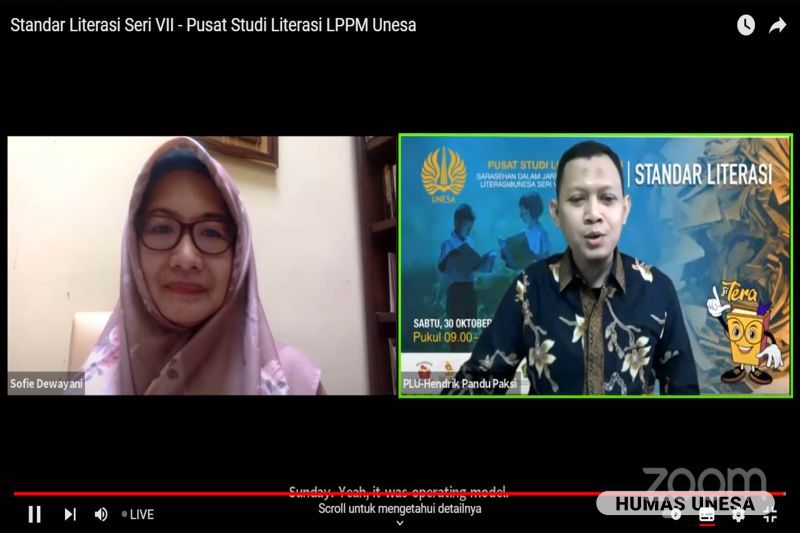
www.unesa.ac.id
Unesa.ac.id, SURABAYA-In strengthening social ties and increasing love for the world of literacy, the Center for Literacy Studies, LPPM UNESA held a 'Serieshan in the Network' (Awareness) of Unesa Literacy Series VII at the National Level with the theme 'Literacy Standards that Coincide with Language Month Starting with the Youth Oath on Saturday, ( 30/10/2021) via Zoom, Youtube, and Telegram Meetings (Sargram).
A total of 225 participants from various regions and various professions participated in the awareness program. There were two speakers who were presented, namely Sofie Dewayani, Ph.D as chairman of the Litara Foundation and Prof. Dr. Hj. Lies Amin Lestari, M.A., M.Pd., as Professor of FBS Unesa. To note, this awareness event is supported by Let's Read The Asia Foundation, Litara Foundation, School Literacy Movement and the Ministry of Religion of Probolinggo Regency.
Deputy Chancellor for General Affairs and Finance, Suprapto, S.Pd., M.T in his speech said that the indicator of the level of cultural literacy in Indonesia is quite low compared to other countries. The level of cultural literacy in Indonesia is very low at around 0.02%. "This is very small but there is a slight increase that can reach around 18%," he said.
According to him, activities like this can encourage a literacy culture, both reading culture and writing culture among students and even the community. He supports the competition held by the Center for Literacy Studies related to writing which is an effort to encourage a writing culture among school students.
Sofie Dewayani, Ph.D said that the literacy competency standard is a framework map as it helps to reflect on the direction to achieve something. Meanwhile, the standard components of student literacy competence consist of word knowledge, grammar knowledge, text knowledge, and visual knowledge.
On that occasion, he also mentioned the components of teacher literacy competency standards according to ILA 2020 which consisted of basic knowledge of literacy, curriculum and learning, assessment and evaluation, understanding of equality and pluralism, understanding of learners and the learning environment, self-development and leadership. , as well as field-specific clinical knowledge and skills.
From the components of teacher literacy competency standards, Sofie explained the reasons for the importance of teacher literacy competency standards. First, because improving students' literacy skills requires a comprehensive effort in the form of growing a fun and text-rich learning environment, giving appreciation for literacy activities and interests, as well as a learning process that strengthens thinking skills through texts according to the characteristics and needs of students.
Second, teachers need to develop themselves professionally in order to improve students' literacy skills effectively. Third, the teacher literacy competency development program needs to be carried out in stages and systematically.
Prof. Dr. Hj. Lies Amin Lestari, M.A., M.Pd., as the second resource person conveyed related to Higher Education Literacy (Information) Standards. He explained that information literacy is related to mastery of information technology, with wider implications for individuals, the education system, and society not only skilled in operating computers, software applications, and databases, but he must also be able to use them for his personal interests, work, and improve the science.
Information literacy in universities not only includes students but also includes other employees. “The subjects of higher education information literacy consist of students, lecturers, education staff, and other employees. While the types of information can be in the form of print and non-print, offline and online, official documents and personal documents, verbal and non-verbal. They get information from libraries, certain communities, the media and the internet,” he said.
Amin Lestari explained the seven steps of the information literacy model developed by Sconul which is useful in improving literacy skills for students. First, identify, namely understanding the information needs. Second, the scope is to determine the type of information, characteristics, challenges. Third, the plan is to determine the search strategy, keywords. Fourth, gather, which is to search and access information. Fifth, evaluate, namely relevance, accuracy, comparison. Sixth, manage, namely managing information, citing, compiling bibliographies, knowing the ethics of using information. Seventh, present, namely compiling information products in the right form and presenting.
On that occasion, Dra. Pratiwi Retnaningdyah, M.Hum., MA, Ph.D., reads out the winners of the 750-word writing competition at the national level for SD/MI/SMP/Mts/SMA/MAN students and the winners of the writing competition at the national level AKM at the SD/MI/SMP level /Mts/SMA/MAN where each participant gets a prize in the form of money. For the 1st place winner, they will get Rp. 750,000, the 2nd place will get Rp. 500,000, and the 3 rd place will get Rp. 300,000. (Esti/zam*)
Share It On:






